by Robert Case | Oct 31, 2024 | Internship Experiences, Uncategorized, Undergraduate Students
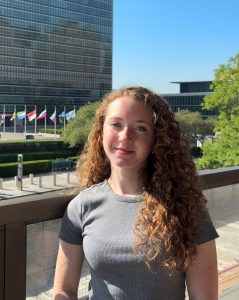
My name is Charlotte Sens, and I am a Diplomacy and International Relations major with minors in Asian Area Studies and Data Visualization. This summer I am interning with the International Rescue Committee in their Workforce Development taskforce, finding work opportunities for refugees mainly coming from Haiti and the Middle East (Palestine and Syria). I mainly craft resumes and apply to jobs for our clients, while also completing intake meetings and doing data entry. I am communicating with many different people in different languages throughout the day, which occasionally presents challenges to clear communication. To expand on this, some of our clients will move out of state and fail to tell our organization, distancing themselves from the services we provide. Other times, I will organize a meeting with a client, but my translation will be slightly incorrect and the conversation will become redundant and frustrating as we both fail to understand each other. However, through this frustration, I have learned to be patient and how to productively address client frustrations while moving forward with our own goal to find them a job.
Refugeeism and migration are significant public concerns within the international community and domestically. This internship has brought to light systematic disadvantages that refugees face in coming to the United States. While I had previously learned of the refuge process in a previous class (ETW: Refugees, Religion, and Politics and International Relations of Southeast Asia), it is very different seeing it in practice. Many of our clients do not speak English or do not have substantial employment history or education or access to a car. As I try to find jobs to accommodate them, I find that many simple, entry-level jobs have unfair requirements far outside the qualifications of my clients. I find that my coursework with the school of diplomacy has helped remedy this, as I have been able to utilize writing and research skills to find businesses that will accommodate my clients, and the resources provided by the school of diplomacy has allowed me to cultivate professional skills so that I can confidently conduct myself both when I’m in the office and when dealing with clients and employers.
The professional skills I have learned throughout this experience, including professional communication and conduct as well as data entry and reporting skills, have made me more confident to enter the work force post-grad. I have also become more familiar with the operations of the migration and refugee system within the United States, and I can bring this knowledge to future experiences. I would highly recommend this internship to other students as it is highly rewarding work, and every task serves to aid refugees and improve their livelihoods. While it may be frustrating or demoralizing at times, it is a very positive experience to be able to help those in need.
by Robert Case | Oct 18, 2024 | Uncategorized
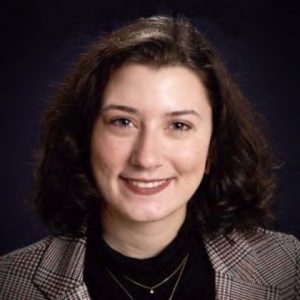
My name is Annie Hebel, and I am a Senior studying Diplomacy and International Relations, Spanish, and Journalism at Seton Hall University. Currently, I am interning with the Refugee Support Services (RSS) division of the International Rescue Committee in Elizabeth, NJ. In this role, I directly support a caseworker in her work with newly arrived families with some form of humanitarian parole, mainly from Haiti and Cuba. My daily tasks often include observing client intakes, filing public benefits applications, and assisting with client communication in Spanish and Haitian Creole.
The most interesting part of my job is getting to learn about the experiences of my clients and helping alleviate them out of difficult situations. Many people who enter the U.S. with humanitarian parole face a significant backlog of time before they can start to work or receive benefits, which often leaves them vulnerable to economic or financial exploitation. The support offered at the IRC helps prevent migrants from falling victim to this by providing a space for them to ask questions and learn about all of the options available to them for support.
This has been a particularly valuable experience thus far because, though I have gotten experience in various other forms of immigration work, I have never worked in a direct support role. Because I want to go into immigration, this is an invaluable experience. I am learning so much about how to respond to direct needs of migrants and develop relationships with organizations that can provide aid. I am also learning so much about how to communicate with clients who speak little to no English, improving my intercultural
communication skills. However, this has also been the biggest challenge – most of our clientele speaks Haitian Creole, which I am only just beginning to learn. It has proven a challenge to be able to fully support these clients and also adjust to using translation services.
Through my internship, I have confirmed that while I want to continue to pursue a career
in the immigration space, I feel as though I am not the most qualified for a direct support, social work-focused role and instead would prefer to work in the legal area of immigration. However, this position has been invaluable to help me develop skills that will translate, such as intercultural communication and a chance to learn and practice Creole. Overall, I would recommend this internship, especially for people who are interested in working with immigrant populations.
-Andrea Hebel, ‘24
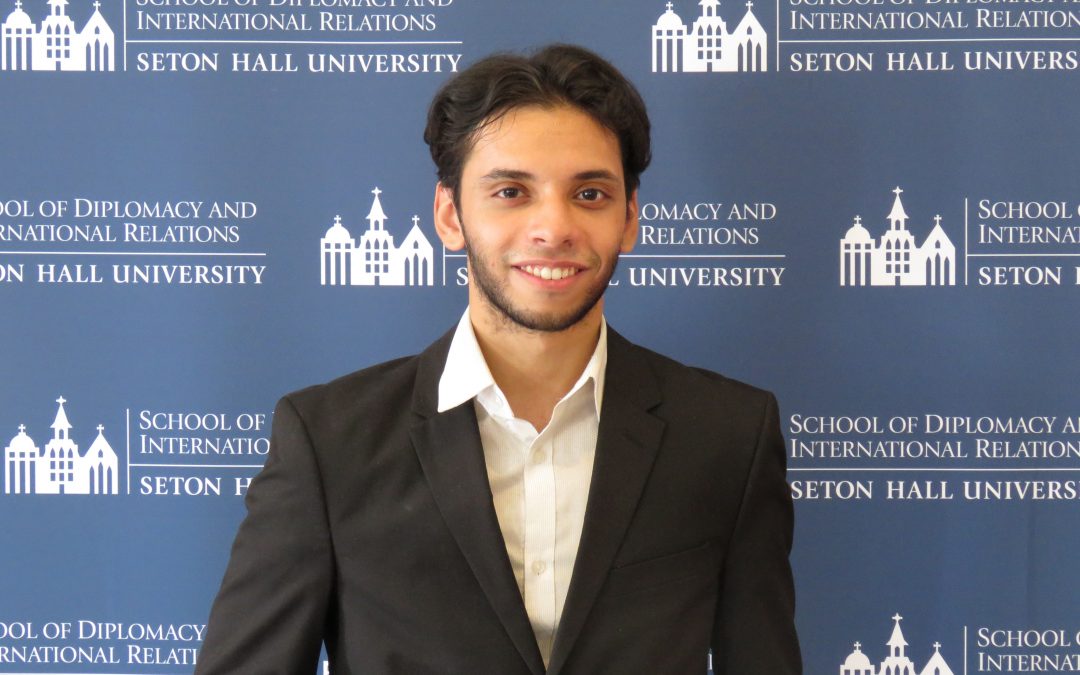
by Alondra Duncan-Belford | Feb 27, 2023 | Internship Experiences, Undergraduate Students
My name is Hamzah Khan and I am a junior in the School of Diplomacy majoring in International Relations and minoring in History, Arabic, and Economics. I interned at the Council on American Islamic Relations-NJ Chapter, the largest Muslim civil rights and advocacy organization in the country as a legal research intern. In my role, I supported the organization’s civil rights department with case intakes and researched laws and government policies in New Jersey that impact the Muslim community. I also worked with the Communications department in researching and writing op-eds, advocating for policies that impact the Muslim community such as free speech laws, Islamophobia in local governments, and religious rights for incarcerated Muslims.
One project I am proud of is our anti-Islamophobia campaign in Edison, New Jersey. Earlier this summer, the Indian Business Association held a parade in Edison for India’s Independence Day but excluded most Indian minority groups like Muslims, Christians, and Sikhs. They also ran an offensive Islamophobic float of a bulldozer which Hindu Nationalist governments in India use to demolish the homes and businesses of Muslims. They also invited a renowned hatemonger from India’s BJP to be the grand marshal of the parade. The local community in Edison was shocked by this event and CAIR spearheaded a multi-organization condemnation and pressure campaign on the local mayors to apologize for attending the event and promise further screening of parades before issuing permits. We also put enough pressure on the Indian Business Association that they publicly apologized for the offensive imagery at the parade and agreed to work with local officials to prevent this from happening in the future.
I also worked on multiple op-eds criticizing the state of New Jersey’s policy of defunding investments in companies that exercise a boycott of Israel on humanitarian grounds. These op-eds criticized this policy’s coercive nature, which stifles the free speech rights of individuals and corporations who want to exercise a peaceful boycott of a country to advocate for human rights. These op-eds were published in renowned New Jersey and national outlets like NorthJersey.com under USA Today, and the Palestinian magazine, Mondoweiss. The opportunity to get published was big for me because I am interested in journalism as well and passionate about issues such as these.
These are two instances where international issues correlated directly with our work as a civil rights organization because we advocate for human rights not only in NJ but internationally as well including India and Israel. I had the opportunity to do research into international human rights as they relate to those two countries and learn more about the geopolitics of the Middle East and South Asia. This internship has allowed me to combine things I have learned in classes like Comparative Foreign Policy and Public International Law to get on hand experience in the field of civil rights advocacy both domestically and abroad. I also got to enhance my research skills which I gained from classes like Investigating IR and DiploLab. I am interested in pursuing a career in law or journalism in the future and this internship helped me to combine both disciplines while also gaining valuable insights by working with experienced lawyers and journalists.
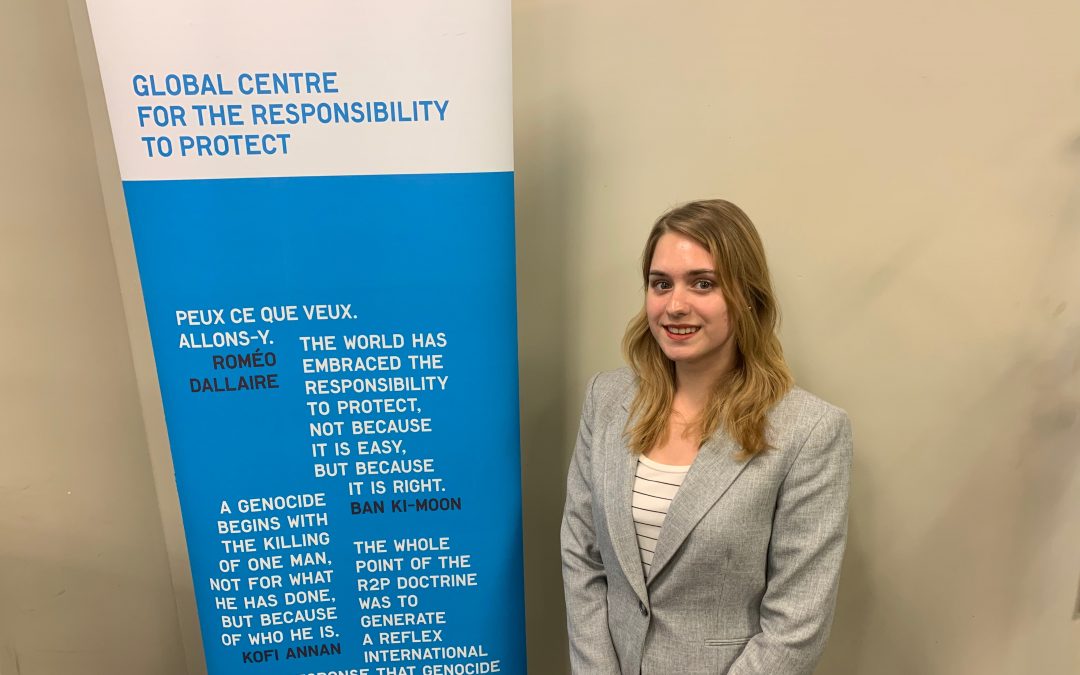
by Madison McHugh | Dec 10, 2019 | Internship Experiences, Undergraduate Students
My name is Stephanie Miller. I am a senior undergraduate student in the Diplomacy and International Relations program with a secondary major in Religious Studies and a minor in Arabic. I completed a research internship at the Global Centre for the Responsibility to Protect in Manhattan, New York.
The Global Centre is a research and advocacy organization that specializes in war crimes, genocide, ethnic crimes, and crimes against humanity. It works with governments, regional bodies, and other NGOs to operationalize the principles of the Responsibility to Protect doctrine into policy frameworks. It also monitors over 20 country situations either at risk or currently committing mass atrocities. As independent institutions, non-profits like the Global Centre are instrumental in ensuring accountability and encouraging inter-governmental action to prevent mass atrocity, and I had a wonderful time working with them.
My decision to pursue this internship was based in curiosity. Mass atrocities are crimes that make international headlines every day, but the corresponding prevention agenda is not something that people usually recognize, even in the classroom. The Global Centre works to bridge the gap between policy and responsible action, calling for the international community to commit to the principles outlined by the Geneva Convention and honor their agreements to protect civilians across the globe. I learned that while this work is not glamorous, it is entirely necessary.
Interning at the Global Centre taught me the difference between humanitarian work and human rights advocacy, cultivating a newfound interest in both. Prior to this internship, I thought that the two terms were mutually interchangeable, and I found that this a common misconception often overlooked. This experience taught me new and transferable skills that are applicable to both fields, honing practical expertise in report writing and analysis, oral communication, conflict mediation, and public engagement. I don’t think I could have found a more supportive and encouraging environment as I developed these new skills, and I look forward to carrying them into my career.
One of the challenges I faced in the beginning of my internship was separating myself from my work. The subject material I was dealing in daily was sometimes difficult to process, and in order to succeed in the position, I had to learn how to leave work in the office rather than take it home with me. I began setting healthy boundaries for myself before I could devote my time and energy to a mission that I quickly grew to care about. This internship taught me more than just practical skills – it taught me a life lesson that many don’t learn until much later, and for this I will always be grateful.
My advice to students looking for internships is to not limit yourself to searching only in the field you are interested in. Diversifying your interests enables you to take advantage of opportunities that you may not have had otherwise. My career goals were vastly different going into this internship than they are now. Working at the Global Centre made me re-evaluate my priorities and consider what I really want to do with my degree after I graduate, which is something I do not think I would have been forced to reckon with if I had worked anywhere else. Internships do not always change your outlook on life, but mine did. I gained new skills, new interests, and a new perspective on the field I want to go into.
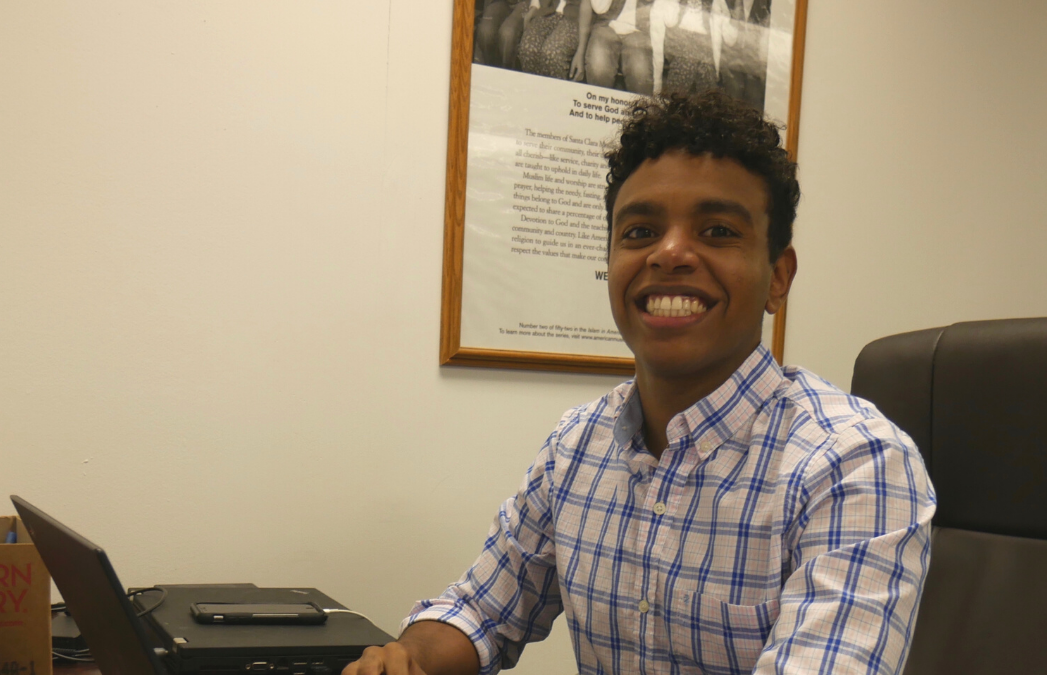
by Madison McHugh | Nov 7, 2019 | Internship Experiences, Undergraduate Students
My name is Mohamed Elshekh, and I am a senior at Seton Hall University studying International Relations and Diplomacy as well as Religious Studies. I interned at the Council on American Islamic Relations, New Jersey Chapter (CAIR-NJ), as the Government Affairs Coordinator. My primary concern while searching for internships was finding a position that combined my passions for diplomacy and religion. CAIR-NJ serves as the largest Muslim civil rights organization in America, with chapters all across the country. This was the ideal position because their goal is to enhance Americans’ understanding of Islam, promote tolerance and justice, and empower American Muslims across the United States.
With CAIR-NJ, I was tasked with communicating the needs of CAIR to various political campaigns and government officials. My biggest responsibility was planning for the Muslim Day of Advocacy (MDA), an annual event held in Trenton, NJ where various Muslim delegates meet with elected officials to advocate on behalf of the Muslim community and educate on concerns. I was tasked with drafting talking points for MDA, preparing a fact sheet of the bills we will be supporting, and recruiting delegates who will be present the day of the event. In addition, I scheduled meetings with government officials so that we would have time to properly prepare our delegates before the meetings and so they would be able to speak about the bills in the NJ legislator and explain why the Muslim community either supports or rejects the proposed bill.
The work I completed with CAIR has transformed my outlook on civil rights work and domestic policy. I believed that as a Diplomacy student, my interests would only align at an internship that focused on issues relating to the international community. With CAIR, I learned that these small steps taken to change domestic policy can have far-reaching effects that alter international policy.
Seton Hall’s School of Diplomacy provided me with the necessary skills to excel in the position. My background in International Relations and U.S foreign policy was essential for communicating with government officials and their staff, as well as creating fact-sheets and writing on behalf of the goals of CAIR. I recommend this internship to students who have a passion for civil rights and advocacy. This position served as a vital tool to my personal and career development. The professional skills and knowledge that I gained from CAIR will continue to help me after I graduate college and enter the job market.
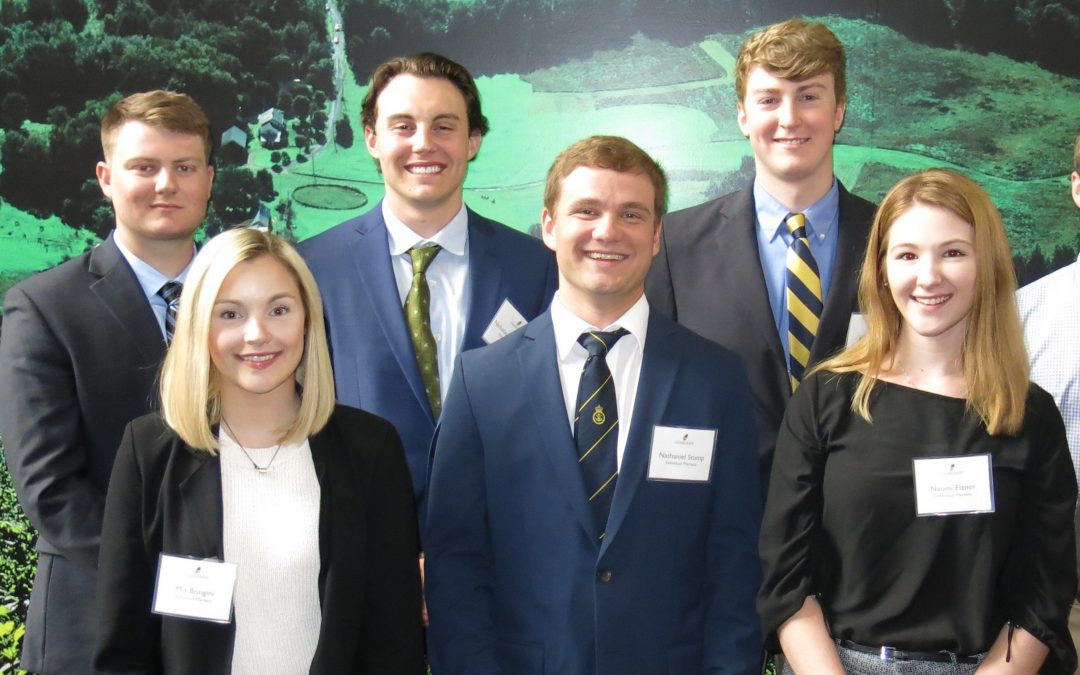
by Madison McHugh | Mar 22, 2019 | Internship Experiences, Undergraduate Students
My name is Austin O’Neill, and I am a senior double-majoring in International Relations and Economics with a minor in Arabic. I completed an internship at Guardian Life Insurance Company of America this semester in addition to my previous full-time internship last summer. My position is in Disability Insurance individual markets under the Product Strategy team.
I originally chose to intern at Guardian Life because they have a large presence in my hometown of Pittsfield, MA, offering a great opportunity very close to home over the summer. I continued to intern with Guardian Life when the Product Strategy team asked me to stay on during the school year to assist with a variety of projects, which indicated that I am considered a valued member of the team.
The department focuses on many different areas of disability insurance products, including research and development, competitive research, product training, filing, and support. I had the chance to assist across every responsibility, providing me with a broad spectrum of learning opportunities. My main responsibilities were preparing files for state insurance agencies, altering documents and content with the rebranding team, and creating PowerPoints and spreadsheets for presentations by the executive team.
One interesting project I completed was designing the PowerPoint for a new product pitch presented by the executive team. The product was considered revolutionary for the market, and I was tasked to express the characteristics of the product. This project was exciting as it had real implications for the highest-ranking officers of Disability, and it allowed me to showcase skills I have learned at the internship and through classes at Seton Hall.
I found a great balance in building skills between my internship and course studies. I became very familiar with Excel, which is a skill I have utilized at school with assignments such as my senior thesis, as well as data collection for the Product Strategy team. While working on product filing assignments for Guardian Life, I received exposure to Adobe Pro, which is important for many different business operations, but was also applicable as a document editing tool for my studies. Additionally, it was interesting to work on the front-end and back-end of rebranding for a large company. I edited and updated documents, and I tested webpages and programming software for consumer friendliness. The skills I learned from these duties are numerous and will help me in my future career.
My internship at Guardian Life helped me develop in both my professional and academic life. I networked across all business areas and may seek full-time opportunities at Guardian Life after graduation. Even as a Fortune 250 company, Guardian Life still seeks to receive input from all its employees, from interns to executive teams. For these reasons, I would suggest others to seek internships at Guardian Life for learning and development in the private sector.
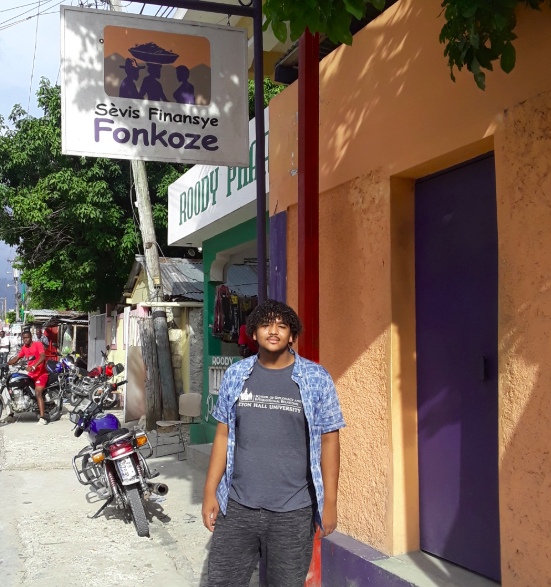
by Madison McHugh | Nov 9, 2018 | Internship Experiences, Undergraduate Students
My name is Kenneth Saint Preux, and I am a junior in the Diplomacy and International Relations program at Seton Hall. Over the summer, I interned in Mirebalais, Haiti for an organization called Fonkoze, an NGO that works to alleviate poverty in Haiti. I interned in their CLM (Chemen Lavi Miyò) program. Chemen Lavi Miyò means “Pathway to a Better Life”. This phrase embodies the program’s goals. CLM’s goal is provide services and empowerment to low-income women across the central plateau region of Haiti. My responsibilities included accompanying case managers to various sites to research and assist on project implementation while managing participants.
Working with an NGO in a developing state gave me access to knowledge that most people would not be able to obtain. Fonkoze gave me an opportunity to better understand the issues that are plaguing Haiti. By understanding these various issues, I am also learning more about the foreign policy of Haiti. Haiti lacks many resources and depends on aid from the U.S. and trade with the Dominican Republic. The Haitian Government’s reliance on aid and trade allows for the poverty issue in Haiti to be exacerbated to the point where it is almost impossible to find “the poorest of the poor” in Haiti.
My coursework has helped during this internship as many of the challenges I encountered came from the cultural differences between the staff and participants. My Cross-Cultural Negotiation and Conflict Management course helped significantly with my communication skills. As I have learned throughout my studies, interacting with those of other cultures is a key component to the art of diplomacy and becoming a practitioner in the field. Another class that helped me with my internship was my Institutions of Global Governance class, teaching me about the functionality of NGOs across various developed and developing nation-states. NGOs play a significant role in Haiti, as they provide services that the Government of Haiti cannot provide. Fonkoze is such an example. The last course I will mention that helped in this internship was my Sustainable Development class, which taught me how nation-states could grow and prosper while also stressing the intersectionality of poverty and economic development. Poverty is not an issue that just simply disappears over time or periods of growth; solutions require massive amounts of effort and research. This connects to my current work, as Fonkoze focuses its efforts on female-headed households, due to their usually being the most fragile of these families under “extreme poverty”.
I would recommend Fonkoze to students interested in gaining experience in the development field. Fonkoze is a great organization that will send you to a place that truly needs help. Fonkoze gives students the opportunity to see a successful NGO in a developing state.
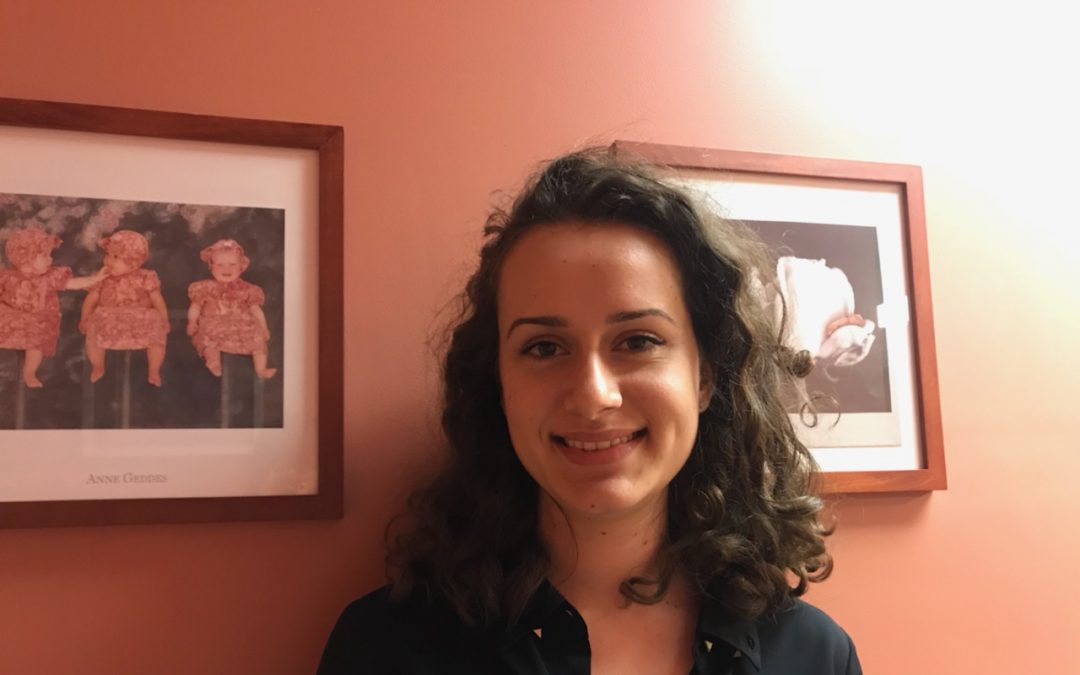
by Madison McHugh | Oct 25, 2018 | Internship Experiences, Undergraduate Students
My name is Zofia Gallegos, and I am a senior Diplomacy & International Relations and Spanish double major. In Spring 2018, I was the Economic Empowerment Intern at the International Rescue Committee (IRC) in Elizabeth, NJ. Coming from a family of immigrants, I was always interested in immigration issues and laws governing immigration to the United States. I knew I would be a good fit for an organization like the IRC, which is dedicated to helping people that have just moved to the country to establish themselves and build their lives in the U.S.
While interning at the IRC, I met many different people from diverse backgrounds. Our clients ranged from middle-aged parents looking to provide a better life for their families, to teenagers and small children who moved to the U.S. and look for guidance towards understanding and becoming accustomed to American culture.
Day to day, my work varied greatly, but I always completed case notes regarding our clients and their developments into ETO software. My fellow interns and I also assisted with career development services or job searches on behalf of our clients. Career development might include learning about a client’s education, skills, and past work experience to determine what type of job he or she would be a good match for. Oftentimes, we helped clients obtain more information about a particular career path that they were pursuing, or we informed them of available job opportunities in the area. We utilized job search engines to look for jobs that would fit their salary needs and qualifications. In addition, I participated in team meetings to discuss the current issues, advancements, and concerns in our department. At these meetings, we discussed what we had accomplished over the week, what our challenges were, and something that we had successfully achieved.
My biggest challenges interning at the IRC were language and cultural barriers. Language barriers are self-explanatory; many times, our clients had recently arrived to the U.S. and had only begun the process of learning the English language. Other clients who came from the Middle East or the Caribbean region also required more attention since I only understand English, Spanish and Polish. Interpreters were typically available to translate, but I would make the attempt as well. Ultimately, I was able to turn my challenges into strengths by engaging with IRC clients in an open and friendly manner and having the patience to understand and communicate. I am happy to have had the opportunity to work with the IRC, and their goals to aid those entering America as immigrants are very much aligned with my long-term goals to help those in similar circumstances. I would recommend an internship with the IRC as you meet a host of incredible people, and the role allows you to learn essential skills in communication.








